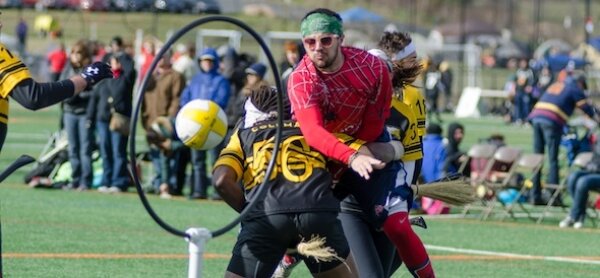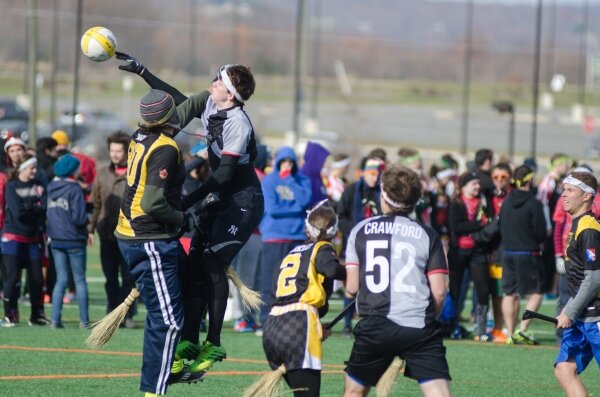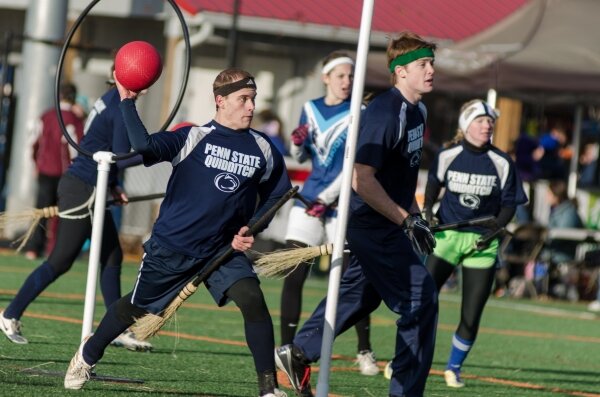Recap
Mid-Atlantic Regional Championship Day Two Recap
MARC saw University of Maryland come out on top and nine other teams struggle in frigid conditions to punch their tickets to Myrtle Beach.

Editor’s Note: Amanda Dallas, the IQA’s editorial manager, and Michael Parada are members of the NYDC Capitalists. For a recap of pool play on day one, go here.
Day two of the Mid-Atlantic Regional Championship was plagued by frigid conditions and wind throwing quaffles, bludgers and hoops in all directions. The beginning of the day saw the close of pool play followed by the announcement of bracket play seeding. The top four seeds went to the NYDC Capitalists, Penn State University (PSU), University of Maryland (UMD) and University of Richmond (UR), respectively. The remainder of the bracket was laid out as follows: Villanova Quidditch Club, University of Virginia (UVA), Johns Hopkins University (JHU), Steel City Quidditch Club (SCQC), Quidditch Club Pittsburgh (Pitt), Appalachian Quidditch, University of North Carolina-Chapel Hill (UNC), Duke University, Rutgers University, Lock Haven University, the Philadelphia Honey Badgers (PHB), Virginia Commonwealth University (VCU), Virginia Tech (VT), Carnegie Mellon Quidditch Club (CMQC), Quidditch Club Carolinas (QCC) and the Horn Tailed Horcruxes.
Seeds 13 through 20 then partook in bracket play-ins, pitting Lock Haven against QCC, PHB against CMQC, Rutgers against Horn Tailed and VCU against VT. Rutgers versus Horn Tailed saw the latter team looking the best it has all season. Horn Tailed, led by the heroics of keeper Sean Sullivan and the newly developed skill of beater Zane Khan, fought hard to come from behind its New Jersey comrades, but, unfortunately, it just was not enough to the young team to brackets. VCU dispatched VT fairly easily. The former team’s beaters held on to bludger control for almost the entirety of the game and played a more aggressive, forward style than usual, allowing VCU keepers Lee Reid and Todd Zimmerman to be led in on the offensive and either easily score or make an unthreatened dish. The PHB and CMQC game was essentially a full-blown rematch of the previous day’s pool play game. PHB, however, won this game on a snitch grab, dodging the double overtime it was plagued with during the previous day’s game. The hardest fought game and one of the biggest surprises of the play-in round was the matchup between Lock Haven and QCC. Lock Haven, a regional favorite to make it to bracket play and potentially snag a World Cup VII bid, fell to World Cup VI attendee QCC. That is not to say Lock Haven did not fight the good fight; QCC only won by 10 points. Though they could not carry their team to a World Cup bid, Lock Haven beaters Billy Gillette and Tyler Potoski deserve recognition. Both are athletes with cannon arms and have the potential to compete with the best in the East if they can get a better grasp of the strategic side of the sport.
The Sweet 16 kicked off with an onslaught of one-sided games. PSU defeated the Philadelphia Honey Badgers in one of three shutouts of the tournament. The depleted Honey Badgers tried, but could not find a way around PSU’s depth. John Hopkins shut down Appalachian Quidditch with a pass-heavy, high-powered offense led by Michael Matesich and Craig Ogurek. Villanova won on a surprisingly low-scoring game against Duke. NYDC had a rematch against VCU which it shutout the previous day 170*-0. Coming back swinging, VCU managed to avoid another shutout against the newly-formed community team, taking out key NYDC players Tony Greco and Mo Haggag in the process. However, a high-scoring, James Hicks-led offense forced VCU to end the game on a suicide catch by Tommy McPhail in hopes of retaining enough energy to qualify via the consolation bracket. UMD, expectantly, dismantled QCC, only allowing one goal. UR put a beatdown on a depleted Rutgers squad, causing them to forfeit the consolation bracket and all hope of a WCVII bid.

The Sweet 16 featured only two close match-ups: UNC versus UVA and SCQC versus Pitt. The newcomers on the revamped SCQC squad made a clear and instant impact. The majority of the community team’s offense ran through keeper Ron Coleman and former Pitt beater David Schreiber. However, experience won out in the end. A key element to Pitt’s offense, returner Kurt Rischel made a surprise move this tournament, playing both chaser and beater. More often than not, Rischel was used to put points on the board in the beginning of the match, then, after a short breather, would return to the field as a beater. Rischel was a standout in both positions, unfortunately, he may be both the best Pitt chaser and the best Pitt beater, causing the opposing position to experience a sudden drop in skill in his absence. The game was exemplified by hero ball plays from both teams and few passes were completed. The match came to a close when Pitt caught the snitch, qualifying the team for another World Cup. The UNC/UVA matchup showed one of the most back and forth, evenly matched games of the day. Though UNC struggled against UVA’s unique defense, led by chaser and coach Kyle Stoclenberg, early on in the game, offensive force and chaser Max Miceli and defensive force and keeper Ed Bartels found a way to bring the team together just in time for the snitch to arrive. However, this game would not end with an easy catch. Beaters from both teams threw their attention to the man in yellow. In the end, Chris Champito saved the day for UNC once again and simultaneously sent UVA to the consolation bracket.
The first round of consolation matches saw a repeat matchup of VCU and SCQC from last year’s Mid-Atlantic Regional Championship. This time, however, the outcome would differ greatly. The physicality of SCQC and hero-ball ability of Coleman were too much for VCU--though the Virginia team is arguably more well-rounded. Following the rematch, Mid-Atlantic Regional Championship attendees saw Appalachian use its sheer athleticism to blow out the battered Honey Badgers, and UVA take down QCC. In one of the surprises of the day, an injury-ridden Rutgers surrendered its final shot at a WCVII bid to Duke with a forfeiture. The end result? Appalachian and SCQC punched two tickets to North Myrtle Beach.
The Elite Eight saw UMD snag a free pass to the semi-finals via a forfeit from UNC. NYDC squared off against Pitt resulting in a score of 100*-0, NYDC. This was only the third shutout of the tournament and the second on NYDC’s MARC record. The scoreboard, however, did not do the game justice. Pitt did not just roll over; the team fought hard and had many close calls, however, NYDC was on its game. Chasers Taylor Crawford, Steve Hysick and Steve Minnich provided solid point defense. That, combined with on-point beating by Amanda Dallas and NYDC's latest addition, Chris Pavlovych, led to the formation of an impenetrable defensive line that Pitt’s game of hero ball could not find a way around. Villanova versus Richmond was the only Elite Eight game to come down to a snitch grab. The evenly-matched teams played a game of back and forth with keeper Jeremy Day leading the offense for Richmond and chasers Andrew Garber and Greg Campbell at the Villanova helm. In the end, Villanova’s seeking proved to still be one of the best in the Mid-Atlantic, sending them to the semi-finals. John Hopkins versus PSU, however, was not a close match. In an unusual twist, JHU chose to not play its usual starters then attempted to forfeit mid-game.

The semi-finals pinned seed-one NYDC against seed-five Villanova and seed-two PSU against seed-three UMD. It would be a night where the lower seeds ended up beating out the higher. The PSU/UMD game was a fairly one-sided affair on paper, but that was mainly due to how long the snitch was on pitch and PSU’s refusal to suicide grab. The Nittany Lion strategy of “run-the-offense-through-Myers” was shut down by UMD’s defensive game. UMD chasers Matt Angelico and Erin Mallory did an excellent job marking their men, eliminating PSU’s go-to passing option Robert Hedges. The nail in the coffin for PSU was the return of the snitch. With beater Scott Axel’s attention turned entirely to the man in yellow, UMD was able to run away with the quaffle game. Although Collin-Leese Thompson put forth a valiant effort guarding the snitch, Harry Greenhouse prevailed, sending UMD to the finals with his grab. The next pitch over, a highly controversial game between NYDC and Villanova played out. One of the shortest games of the tournament where there was more stoppage than quaffle play, due to an onslaught of complaints regarding calls, NYDC was never able to find its flow or gain momentum. During the gameplay that did take place, Garber and Campbell showed their chemistry once again scoring on their first possession to give Villanova its 10-0 lead. Campbell then switched from chaser to keeper to provide more size in front of the hoops and, in turn, allow Khalil Taylor to play point defense for Villanova. This move slowed the game down even more, killing what little momentum NYDC manifested after a hat trick by Michael “Yada” Parada and a solo breakaway goal by Hysick that propelled NYDC to 40-20. After a line change by NYDC and multiple stoppages, Villanova was able to fight its way back. The x-factor of this game was Villanova’s beaters, who held control for the majority of the game. When the snitch returned, another unusual situation played out. NYDC, a team noted for turning up its game the moment the snitch returns, would not have a chance to dabble with on-pitch seeker game. Only two attempts were made at the snitch by either team: a miss by Villanova’s Dan Takaki followed by a catch by Takaki. All in all, it was Villanova’s grind-out strategy that won out over the athleticism of NYDC.
The finals of the Mid-Atlantic Regional Championship was a true grudge match, reuniting the two teams that fought on the same stage last year. Villanova moved on after a stoppage-riddled game against the NYDC Capitalists, while Maryland Quidditch came into it after a long, but decisive, victory over PSU. Spectators saw Villanova take an early lead over a tired Maryland, which they held onto throughout most of the game thanks to Taylor doing more than his share of scoring by managing to repeatedly position himself behind the Maryland hoops. UMD’s defense struggled at the start with freshman beater Jeremy Dehn taking a concussion early. On the offensive side, UMD took a while to get warmed up and played an unusually hurried game, missing passes and shots the team’s chasers had easily made throughout the day and allowing turnovers before beaters had the chance to regain control. Villanova’s chasers, protected by beaters Cerone and Michael Barett, took full advantage of these faux-pas to implement multiple fast breaks. However, the Maryland defense adjusted. Point defenders Eric King and Steven Sleasman began laying big hits, shutting down numerous offensive drives. Keepers Sam Gaffigan and Danny Helbling and chaser Mallory fired back with a quick succession of goals, bringing the game to a tie before the snitch returned. As with the finals last year, this one came down to the snitch grab. Beaters on both sides moved their focus to the snitch, but the Villanova beaters, who often gravitate toward placement in close proximity to their own hoops, struggled when in the open field and faced with veteran UMD beater Ricky Nelson and freshman Emily Camardo. UMD gained clear and concise control over the seeker and beater game. This left one of the IQA’s best seekers, Greenhouse, to pursue the snitch in a one-on-one battle. Maryland came out on top in freezing weather, proving revenge is a dish best served cold.
Additional reporting by Max Miceli and Ricky Nelson.

